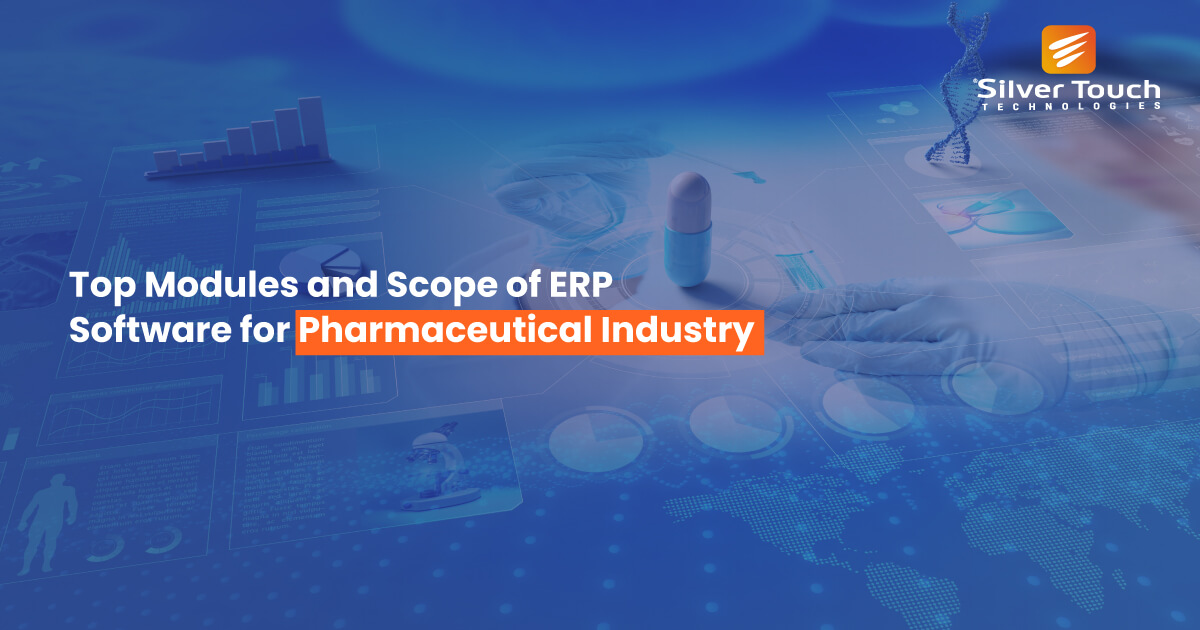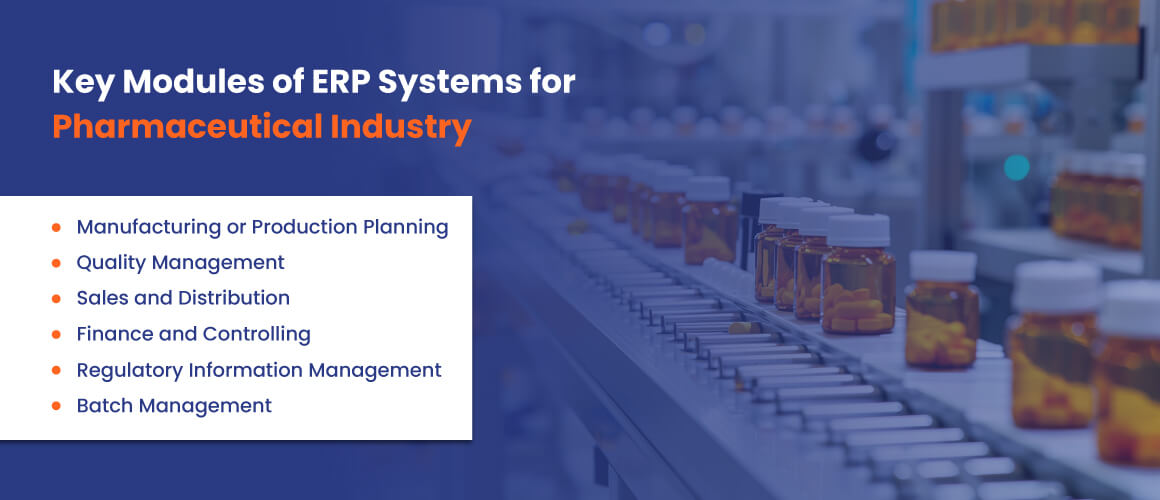The pharmaceutical industry deals with stringent regulations and other complex challenges. Some of these challenges include the meticulous management of R&D and quality control in all the drugs or pharmaceutical products. Here, ERP for pharma industry emerges as a powerful tool to address unique challenges. In this post, we will dig deep into the importance of ERP software for pharma sector and its implementation challenges.
Let’s start with discussing the core requirements of the pharmaceutical industry.
Understanding Core Needs of the Pharma Industry
The pharmaceutical industry has distinct requirements that ERP (Enterprise Resource Planning) systems can address. ERP for pharmacy is specifically designed to meet the following requirements of the sector-
Regulatory Compliance
This sector must meet stringent regulations of bodies like the EMA and the FDA. It is, therefore, necessary to have a robust system for documentation and audit trails. An ERP system can help the pharmaceutical sector to adhere to Good Manufacturing Practices (GMP).
Quality Control
The pharmaceutical sector needs proper quality control throughout its production lifecycle, ranging from raw materials to finished drugs. Here, the ERP system can facilitate quality control with built-in quality management modules.
Pharma Supply Chain
ERP for pharma industry can address the complexities of the pharmaceutical supply chain, including global sourcing, cold chain management, and strockouts or overstocking situations. Another challenge is managing expiry dates and perishable drugs.
Batch Management
The pharmaceutical industry needs to track medicines from origin to patient for recalling and meeting regulatory requirements. Therefore, batch management and traceability are always critical for this sector.
Data Accuracy
When it comes to making informed decisions, ERP systems can offer accurate data in real time across all the functions and departments. The pharmaceutical sector can get insights into research, development, and sales to drive efficiency.
Let’s dig deep into the key modules of ERP for pharmacy sector.
ERP for Pharma Industry and Its Key Modules
An ERP for the pharmaceutical industry is a comprehensive solution for managing and integrating core processes related to this sector. It helps pharma companies navigate the complex regulatory landscape and manage intricate supply chains. Here are the key modules of an ERP for pharma industry-
Manufacturing or Production Planning– It ensures that the entire production lifecycle runs smoothly by managing planning, scheduling, and execution of manufacturing processes.
Quality Management – It assists companies in quality planning, inspection, and control for addressing regulatory compliance like GMP and HIPAA.
Sales and Distribution – It is useful for managing sales orders, pricing, billing, and shipping. It has features to track and trace pharmaceutical products or medicines.
Finance and Controlling – It monitors all financial transactions and cost management. It gives valuable insights into the financial health of the pharmaceutical company.
Regulatory Information Management – It manages regulatory data, compliance-related documentation, and other reporting requirements. It is crucial for meeting regulations.
Batch Management – It provides pharmaceutical companies with the ability to track pharmaceutical products by batch and serial numbers for better traceability.
Other important modules are warehouse management, plant maintenance, and EHS (Environment, Health, and Safety).
How ERP for Pharmacies Streamlines Retail Operations
ERP solutions can streamline pharmaceutical operations by integrating various business processes into a centralised system. These solutions can automate workflows and offer real-time visibility across the pharmacy value chain.
Let’s understand this with the example of SAP in pharma industry.SAP Retail is one of the SAP pharma modules that integrates with SAP Inventory Management and SAP Sales and Distribution. It enables pharmacies to manage their inventory, track prescriptions, and process sales transactions seamlessly. This integration is beneficial for maintaining stock levels and reducing human errors that resulting in better adherence to prevalent regulations.
Facilitating personalised services and tracking patient purchase history are other benefits of SAP in pharma industry. It has capabilities for tracking controlled substances and managing expiry dates. SAP pharma modules can automate refill reminders and support targeted marketing campaigns. These modules also empower pharmacy owners and managers to get valuable insights into different aspects.
Simplify compliance and scale with confidence using ERP for the pharma industry.
Implementation Challenges & Best Practice
Implementing an ERP system in a pharmaceutical company is a complicated task. The critical nature of quality control, patient safety, and prevalent regulations make it more challenging. Here are the key ERP Implementation Strategies in ERP for the pharmaceutical sector-
Data Security and Privacy
Pharmaceutical companies deal with research information, intellectual properties, and other sensitive data. It requires robust security measures within the Pharmaceutical ERP system to prevent breaches. Moreover, complying with regulations like HIPAA is a big challenge.
Complex Supply Chains
Medical and pharmaceutical supply chains are highly complex as they involve multiple stakeholders and strict temperature/humidity control requirements. It is challenging to integrate and manage these supply chains within an ERP.
Integration with Legacy Systems
This is one of the biggest implementation challenges for the ERP for pharma company. Many pharmaceutical industries rely on outdated and disparate systems for performing specific functions. Combining an ERP solution with these systems is a daunting task.
Change Management and Adoption
The implementation of a new ERP system needs significant changes in processes and workflows. It is possible that employees resist a new system, and a lack of proper training can affect user adoption.
Validation and Testing
Thorough validation and testing of the ERP system is essential to ensure that all its features work properly. It should meet regulatory requirements and maintain data integrity. However, this validation and testing are resource-intensive and time-consuming processes.
Apart from these challenges, customization and configuration while maintaining quality also create hurdles in implementing ERP solutions. It is better to consult a reputed ERP solutions provider to get rid of these challenges and leverage the benefits of advanced software. A reliable ERP software provider follows the best practices to address these challenges.
Best ERP implementation practices start with accurate planning with a blueprint of objectives, scope, timelines, and budget. The ERP solution provider needs to assign a project team with dedicated and experienced developers who can follow a structured methodology. The pharmaceutical company should involve representatives from all departments, including R&D, quality, regulations, finance, and sales, throughout the process.
Finally, it is imperative to prioritize data quality and build a comprehensive change management plan for effective implementation. Testing and training are other crucial components of the implementation process.
Future of ERP Software in Pharma- Trends and Innovations
The future of ERP solutions in the pharmaceutical industry can bring significant transformation by using advancements in emerging technologies. AI and ML will play a crucial role in automating routine tasks and supply chain optimisation. These technologies will enhance decision-making across the pharmaceutical value chain. Moreover, the Integration of IoT will enable pharmaceutical industries to monitor equipment performance in real time.
Cloud-based ERP Solutions will bring more scalability, flexibility, and accessibility to pharmaceutical companies. Blockchain technology is also gaining ground in the sector for ensuring high security of sensitive data. We can expect that advancements in ERP software for pharma will contribute to increasing efficiency and improving adherence to regulations in the coming years.
Concluding Remarks
ERP can be a game-changer in a highly regulated pharmaceutical sector. It has different modules like manufacturing planning, quality management, sales and distribution, etc., to streamline processes and comply with regulations. However, companies need to address several critical implementation challenges by following best practices to gain the advantage of ERP for pharma industry.






